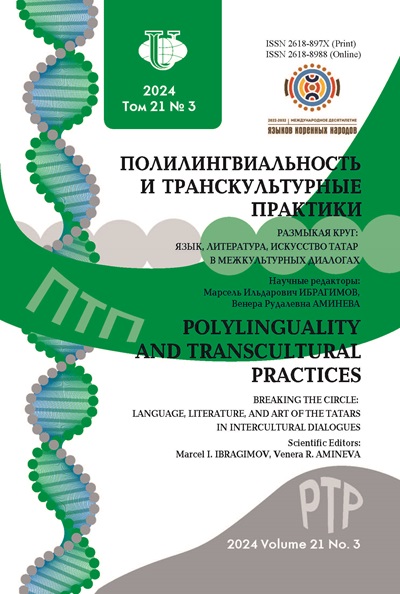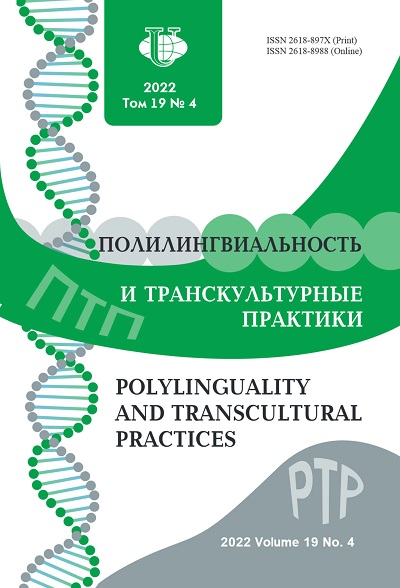Academic Presentation in PechaKucha Format is a Professional Component of Bilingual Students in an Online Communication Environment
- Authors: Vasileva A.A.1
-
Affiliations:
- Moscow State Institute of International Relations (University) of the Ministry of Foreign Affairs of the Russian Federation
- Issue: Vol 19, No 4 (2022)
- Pages: 708-714
- Section: ARSENAL
- URL: https://journals.rudn.ru/polylinguality/article/view/32869
- DOI: https://doi.org/10.22363/2618-897X-2022-19-4-708-714
Cite item
Full Text
Abstract
The article is devoted to the analysis of interactive technologies in Russian as a foreign language classes in the conditions of network communication, which expanded the field of traditional practices and became a new educational environment. This article considers the application of Pechakucha format within the framework of teaching Russian as a foreign language. The application of such modern educational technologies is an effective and appropriate form of organizing the educational process. The relevance of the topic of the study is due to the rapidly developing information technologies that allow successful training of bilingual students in academic skills and contribute to the training of an autonomous student. The following methods were used in the work: general scientific method, comparative analysis method, descriptive method, including the method of observation, interpretation, generalization, as well as experimental methods. The article attempts to show the results of applying the academic presentation in the PechaKucha format as a special format of translating new scientific knowledge on the basis of our own experience. The presented format was used when preparing students for a scientific and practical conference.
About the authors
Anna A. Vasileva
Moscow State Institute of International Relations (University) of the Ministry of Foreign Affairs of the Russian Federation
Author for correspondence.
Email: Vasilyevaaa_mgimo@mail.ru
ORCID iD: 0000-0002-9064-8534
Candidate in Philology, Senior lecturer of the Russian language Department
76, Prospect Vernadskogo, Moscow, 119454, Russian FederationReferences
- Smirnova, N.V. 2015. “Akademicheskaya gramotnost’ i pis’mo v vuze: ot teorii k praktike”. Vysshee obrazovanie v Rossii 6: 58—64. Print. (In Russ.)
- Pyshkalo, A.M. 1975. “Metodicheskaya sistema obucheniya geometrii v nachal’noj shkole”. Doctoral Thesis. 60 p. Print. (In Russ.)
- Tyler, T.R. 2002. “Is the Internet changing social life? It seems the more things change, the more they stay the same”. Journal of Social Issues 58(1): 195—205.
- Danil’chuk, E.V. 2002. Informacionnye tekhnologii v obrazovanii: Ucheb. Posobie dlya studentov vuzov, obuchayushchikhsya po ped. spetsial’nostyam. Volgograd: Peremena. Print. (In Russ.)
- Tuzlukova, V.I. 2002. “Mezhdunarodnaya pedagogicheskaya terminologiya: teoriya, praktika, perspektivy”: Doctoral Thesis. 46 p. Print. (In Russ.)
- Snyder, I. 2002. “Communication, imagination, critique — literacy education for the electronic age”. Silicon Literacies: Communication, Innovation and Education in the Electronic Age. London UK: Routledge. Pp. 173—183. Print.
- Cummins, J., Brown K., Sayers, D. 2007. Literacy, technology, diversity: teaching for success in changing times. Allyn & Bacon. Print.
- Green, B., Beavis, C. 2012. “Literacy in 3D: An integrated perspective in theory and practice”. Australian Council for Educational Research. Victoria: ACER Press. Print.
- Ivanova, S.V. 2015. “Metodologicheskie problemy filosofii obrazovaniya i didaktiki v epohu ‘peremen’”. Vestnik Moskovskogo universiteta. Ser. 20. Pedagogicheskoe obrazovanie 4: 18—29. Print. (In Russ.)
- Novikov, A.M. 2008. Postindustrial’noe obrazovanie. Moscow: Egves. Print. (In Russ.)
- Ivanova, S.F. 2001. Specifika publichnoj rechi. Moscow: Delo. Print. (In Russ.)
- Dynkowska, M., Lobin H., Ermakova, V. 2012. “Erfolgreich präsentieren in der Wissenschaft? Empirische Untersuchungen zur kommunikativen und kognitiven Wirkung von Präsentationen”. Zeitschrift für angewandte linguistik. P. 33—65. (In Ger.)
- Kupriyanov, A.V. 2011. “Akademicheskoe pis’mo i akademicheskaya zhizn’: opyt adaptacii kursa v nedruzhestvennoj institucional’noj srede”. Vysshee obrazovanie v Rossii 10: 31—32. (In Russ.)















